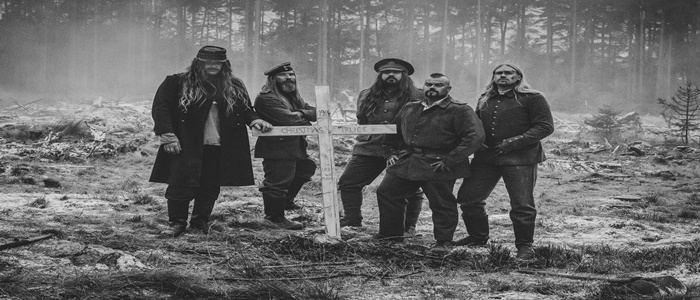Sabaton – Never Stops
Tuesday, 8th March 2022
Adhering to a strong record/tour schedule, Sabaton have elevated themselves to headline status and festival main attraction in an era where legends are retiring or dissolving. Recording another album of stories based on World War I for The War to End All Wars, followers can expect more stirring anthems in the band’s revered power metal platform. We reached out to drummer Hannes Van Dahl who brought us up to speed on the unique recording circumstances for this effort – the special relationships developed through the historical content in the lyrics between the fans, his growth as a drummer and tips for younger musicians when it comes to their craft, plus some of his best memories during his time with the group.
Dead Rhetoric: The War to End All Wars is the latest Sabaton studio record. Tell us from your perspective the creative and recording process this time around – do you believe the pandemic allowed the group more freedom and ability to develop these songs exactly the way you wanted without worry of timing, schedules, etc.?
Hannes Van Dahl: First off, in this band the writing process never stops. We would write on tour, on days off, when we are at home. It’s an ongoing process that always keeps on going. When we entered the studio to record The War to End All Wars, we had to keep in mind that it was pretty early into this pandemic. We had to think about how we were going to do this recording in the safest way possible, with also all the regulations that were in hand. Obviously, we couldn’t have somebody get infected in the middle of the recording, as that would put everything on hold. We kept the personnel at a minimum as necessary for the recordings that had to be done, when we actually started recording this.
For the drum recordings, it was myself, Joakim, and Jonas Kjellgren who recorded and produced this album. Which was kind of strange in a way, but we have Facetime too and it was easy to send ideas to the other guys, have them think about it. I think it ended up going very smoothly.
Dead Rhetoric: With this being your fourth studio album for Sabaton, how would you assess the development of the group from Heroes to The War to End All Wars? Do you believe you’ve made steady improvements or minor changes as you gain more confidence and seasoning to know where you want the band to go for substance and style?
Van Dahl: Yes, I think so. It’s an ever-evolving machinery. It has to be that, otherwise I think both the fans and the band would get bored. You have to change in a way, but you have to be careful that it’s not too big of a change. I really think with this new album – to me personally, it feels like the best possible album that we could do. Being where we are now. I’m super proud of it now, it sounds great. To me it’s one of those albums where it’s a real joy to start from the first track “Sarajevo” and then work your way all the way down to “Versailles”. I like those kinds of albums, that you can digest in one setting. Maybe I’m old school like that.
Dead Rhetoric: I do think there are plenty of old school people that still want to consume a full record front to back, even in a marketplace where digital streaming is as important as the physical product…
Van Dahl: Yes, I think so too.
Dead Rhetoric: Has it been a challenge to figure out what singles to release first?
Van Dahl: That is all within the band. It’s always super tricky to get it right. It’s the first taste of the album. But then again, there are some curveballs on this album. I think “Soldier of Heaven” is one of those. We have had a lot of time also to make sure there are a lot of good music videos to cover the singles.
Dead Rhetoric: Once again World War I history is the subject matter tackled as a follow-up to The Great War. What impresses you most in developing these storylines, the research that’s done, and the investment the band (as well as the fans) have regarding the marriage of history to Sabaton’s music?
Van Dahl: I think when we wrapped up The Great War, we felt that there were so many stories that we couldn’t fit on that album. The album is only that long, there were so many stories we found very interesting, fantastic stories that we didn’t want to not do. That’s when the idea came up that we should do a sequel to The Great War, where we could continue this. It’s hard to cover a whole conflict in one album. The stories were too good not to do songs about.
Dead Rhetoric: A couple of years back you introduced a Sabaton history channel on YouTube – do you believe this attention to detail has also brought people from outside the normal metal supporting channels into the world of Sabaton?
Van Dahl: Yeah, I hope so. Maybe that wasn’t our original intention. To Sabaton, if you are into history and you want to dig deeper than the songs, it’s completely possible to do so by getting the books, watching the documentaries, going into the Sabaton history channel to know more about the stories that make the songs. If you also want to drink beer, listen to heavy metal, and listen to Sabaton, that’s completely possible to. It’s such a nice bonus – if you want to delve into it, it’s there – and if you don’t want to, that’s cool too.
Dead Rhetoric: Being a self-managed entity, what have been some of the keys to remain sharp and focused tackling not just the recording/touring duties as a group but also navigating the trickiness of the music industry and the many outside people involved on a global scale?
Van Dahl: I think being aware and keeping your eyes open for things. One being, being very close to your fans is a very important thing because those are the people who will pay your rent, make sure you can pay your rent. Listen to what they say, what they are into, and be very close to them. Sometimes people forget that it’s not a band who makes the show – it’s the band and the audience who makes it together.
Dead Rhetoric: Has it been more difficult as the fanbase grows to try and keep that connection at a grassroots level? Sometimes you are playing festival shows in front of hundreds of thousands of people…
Van Dahl: Yes. You can’t get to know everyone at that level. The Sabaton history channel is one way to connect. We have a lot of really good material on our channels when it comes to vlogging on the road, these kinds of things. It is a challenge, but it is creative to find ways on how to develop that, make it better. I don’t know if you know this, but a lot of our songs that ended up on an album, they come from stories that are submitted by fans that we simply didn’t know about.
We are musicians first and foremost that have a genuine interest in history, but we are not historians. When it comes to stories and tips about people or events, everything gets read and its super cool with the relationship for the people who send it in.
Dead Rhetoric: Considering the band’s relentless touring schedule throughout most of your career, how has the band handled this extended downtime because of the pandemic? Have you enjoyed being more of a father, or are you growing restless to be back on the road?
Van Dahl: That’s a good question. We started doing this for a reason, we enjoy being out on the road, traveling and meeting our friends and fans all over the world. It was a big change, getting cut off all of a sudden like that. Now what? We made a plan pretty quickly to stay active, as active as we could. Instead of looking things we can’t do, well, what can we do? We’ve been surprisingly active during these two years – with a lot of things, actually. And now in hindsight, I’m very grateful for the time spent with my family. And my dog, and we have horses. Now it is time to go back out, for sure. The balance needs to be there too, when it comes to that.
Dead Rhetoric: How would you assess your growth and approach to drumming from your start as a musician into what you do with Sabaton? Do you feel that there are other aspects you would like to add to your approach in the coming years?
Van Dahl: I play a lot less than I used to when it comes to the development of my skills as a drummer. I focus a lot more on the groove itself versus the drum fills. Which I really enjoy. There was a time when you only thought about cool drum fills as a drummer. Now to me, it’s more about the groove and keeping things in the pocket – and when you play a drum fill, it has to be there for a good reason. To make the song better – and if doesn’t, it doesn’t belong (there) to me. We are looking to the future – I want to keep doing this, stay healthy, and enjoy it – and I will end up being the happiest guy.
Dead Rhetoric: What would surprise people to learn about the members of Sabaton in their downtime away from the band when you have the energy, passion and time to do so?
Van Dahl: What would surprise fans? I don’t know… I like to shoot a lot of film. We have horses and dogs. And that’s it, I guess. Nothing crazier then that.
Dead Rhetoric: When looking at your career arc, what would you say are some of the standout and special moments that have happened to date? Either related to the records, tours, festival appearances, or any other standout moments that will stay forever in the memory banks?
Van Dahl: For sure, meeting some of the veterans that we actually sing about. That is one of the highlights, and its such few people that have been able to have that relationship. I’m super grateful for that, and it’s rewarding in a way as well. Going on tour with the bands that you grew up listening to – Iron Maiden, Judas Priest. Those surreal moments, they will forever be in my memory. Playing Wacken, headlining on both stages in 2019, that’s another one. There (are) a lot of great memories.
Dead Rhetoric: Do younger musicians reach out to you for advice regarding drumming or other aspects of the music business/industry – and if so, what words of wisdom or ideas to think about do you try to impart on them?
Van Dahl: Often, it’s drummers who want to learn how to play certain things. I remember, I thought about the same thing as a young drummer. Very often, these musicians want to learn something very quickly. How do I play double bass drums at 200 BPM tomorrow? And then I have to be the truthful, old guy in the sense that this doesn’t work like that. It takes a long time. You have to have patience for it. I learned this from a teacher of mine – sometimes you can practice a lot, but it doesn’t matter what you practice, it’s not the hours you put into it, but it’s how you practice. Practice effectively at being efficient in your practicing. What am I bad at, and how do I get better? You can make a great plan and a schedule for when to do what. That would be a good tip. Have fun – that’s still the most important thing.
Dead Rhetoric: What’s on the agenda for Sabaton over the next year or two for touring, promotion, etc.? Does the band have any major goals left to accomplish – as it seems like you’ve set yourselves up to be steady festival headliners based on your work and following?
Van Dahl: Yes, exactly. Our biggest focus is on promoting the new album. We will do a short trip to England, then the tour starts. In April we are doing thirty dates in Europe, across Sweden, which have been postponed a few times. Then it’s a summer of festivals – so much stuff in the pipeline that I can’t necessarily talk about. We want to get out and do what we do.




























